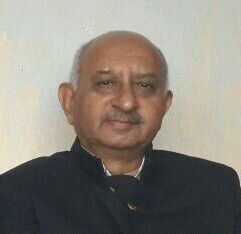Q.1 Tell us a little about yourself?
A. I’m a former army officer and
retired at the rank of Major General. Was educated at Mayo College, Ajmer.
Q.2 Do you have any upcoming books?
A. Karuna and I have put our thinking
caps on. We will decide in a month or two. It will again be a historical novel
hopefully.
Q.3 When and why did you begin
writing?
A. I
have been writing articles since school days. I published my first book in
2012. It was the biography of late Lt Gen Sagat Singh and was titled, A Talent for War.
Q.4 What drew you to the historical
fiction genre?
A. It is the best way to express the
emotional perception of an age where historical facts are scarce. It allowed us to make Meera into a flesh and blood figure.
Q.5 Which authors do you think creates the most successful historical fiction?
A. I have read this genre since I was
a boy. The authors who come to mind are Samuel Shellabarger, Tim Wilcox,
Georgette Heyer, Simon Scarrow, Conn Iggledun, Hilary Mantel, and Bernard
Cornwell to name just a few.
Q.6 What role does research play in
successful historical fiction?
A. Without research, any historical
fiction is not worth the paper it is written on. The story must be grounded on
the events of that period.
Q.7 Do you judge historical fiction
differently from contemporary fiction?
A. Yes! Good historical fiction
brings out the events of a period alive in a manner no other genre can.
Q.8 Where do you hope to take your
writing in the future?
A. I would at some stage like to
write contemporary military fiction, but the process takes time. By the time I
started on my first book and got my second book published it’s taken 10 years
and may never have happened if Karuna had not taken the initiative.
Q.9 In your opinion, what aspects
prevent a novel from being designated successful historical fiction?
A. If the novel does not stick to the
historical facts and characters as known and does not examine the setting of
that period clinically, it has failed as historical fiction and would be more
on the lines of historical fantasy. It should also bring out the texture and
emotions of that period.
Q.10 Outside of your family members,
name one entity that supported your commitment to become a published author?
A. A lot of my friends and
contemporaries from the military, especially the General’s family, encouraged
me in my first book. With regards, the second book, VP Singh Badnore, The Governor of Punjab was a great source of encouragement.
Q.11 How do you describe your writing
experience with Karuna Sinh? If you have different opinions on a particular
situation, how did you resolve it?
A. The book could not have been
written without Karuna. She did the drudgery and constantly encouraged me to
write. Besides, she set the tone and context for the book. I could not pass
a chapter until it cleared her critical eye.
Q.12 Do you believe in writer’s
block? If yes, how do you deal with it?
A. I have never felt it once I start
writing. I have already planned the pathway and thereafter the story follows.
As regards this book I always got the feeling that Meera and others were
reaching out to me to tell their story.
Q.13 Imagine a future where you no
longer write. What would you do?
A. I have other interests; the most
pleasurable one is reading. Nothing like immersing oneself in a good book
and spending hours.
Q.14 Do you have any unique and
quirky writing habits?
A. I won’t say quirky, but before I
start on a chapter I make notes of aspects I want to cover in it. At times a
particular aspect can’t be fitted. It rankles till I fit it somewhere. This has
its disadvantages though as one tends to cram in more detail.
Q.15 If you had to do it all over
again, would you change anything in your books?
A. No. I repeatedly revise chapters
and then the book. Once it’s handed over to the publisher it’s done.
Q.16 What is the most unethical
practice in the publishing industry?
A. The Indian publishing industry is
opaque, discourages newcomers, and does not have depth in its editors. I am
lucky in my publisher but I am aware of several budding talents who gave up in
despair. The problem is that publishing in India is not very profitable. People
don’t read.
Q.17 What advice do you have for
aspiring authors?
A. Persist. Don’t give up. If you
have it in you your talents will rise. Also, hedge i.e. have an alternative source
of income. Writers make little or no money.
Q.18 Which famous person, living or
dead would you like to meet and why?
A. I’m fascinated with many
personages in Rajput history. At the moment am taken up with Abbaka Chowta, the
17 Century Queen of Ullal, who stood up to the Portuguese.
Q.19 What is your favorite book and
why?
A. It’s a slim and little-known book
called The Token wrote by Samuel Shellabarger. It’s a story of medieval
France and the wife of a knight, who leaves her to go on the Crusades. Every
word sensitively brings out the atmosphere of that era and the high courage of
the heroine.
Q.20 Share the experience of your
journey so far?
A. I’m from a military family and we
always thought service in the armed forces was fore-ordained and part of our
life. Never regretted it though has served in the worst areas and under worst
circumstances.
Share your social account
links –
Twitter - @sinhgohil

Typically Randhir Sinh . Free Frank and forthright. Enjoyed reading the chat.
ReplyDelete